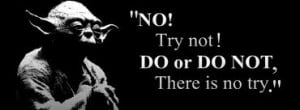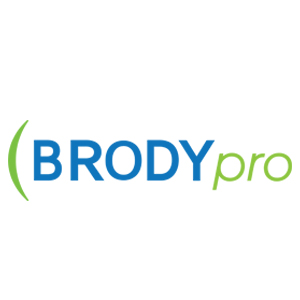 I often discuss things you need to know and implement to get ahead of the curve and keep your career moving.
I often discuss things you need to know and implement to get ahead of the curve and keep your career moving.
I’ve talked about bolstering your body language, modulating your vocal pitch, punching up your presentation style, and a lot more. Today, I want to talk about word choice.
I know, you’re thinking, “It’s not enough that I have to dress, stand, shake hands, make calls, write memos, and give presentations a certain way – now I’m also supposed to monitor every little word that comes out of my mouth?”
Well, not every little word. But, there are some little words, and I do mean little ones, that would be best excised from your working day vocabulary. Let’s start with the tiny, three-letter, innocuous sounding word “try.”
We’re all familiar with that famous line from Star Wars, spoken by the iconic Yoda: “Do or do not. There is no try.” Great line, great scene, great writing — and great impact. But the line is memorable for a deeper reason.
Whether you’re training to be a Jedi Knight or a sales superstar, there’s some very important psychology underlying Yoda’s oft-quoted pronouncement that you might want to explore and embrace.
Consider the differences between these possible answers to a client’s question, or to your manager’s question seeking assistance on a task or project:
“I’ll try to help you with that.”
Versus:
“I can help you with that.”
The first reply might be more accurate, perhaps even more honest, if you are not 100 percent sure that you can accomplish the task.
But, the second answers conveys confidence and authority, which are appealing qualities. That level of confidence might just give you the push you need to ensure you are able to accomplish the task. You’ll feel a bit more urgency to live up to your words.
Saying “I’ll try” is a bit of a cop-out. It’s a back door, disguised as honesty. It’s a safety net, if the going gets too tough. After all, you never said you would or could do it, you only said you’d try.
Might any of this (probably) subconscious reasoning apply to you? Now is the time to be completely honest.
It all comes back to a point I’ve made over and over: knowing yourself and what makes you tick is the bottom-line foundation of personal, professional, and career development.
Change up your responses and see what happens. If your normal reply would be, “I’ll try,” see what kinds of thoughts and fears emerge if, instead, you say, “Yes, I can do that for you.” Are those thoughts and fears valid, or are they just silly “stuff” getting in your way? Be realistic here.
This could mark the beginning of a shift from an employee mindset to a more entrepreneurial or leadership mindset.
What do you think? Are you willing to give it a “try?” More about word choices in my next post.
